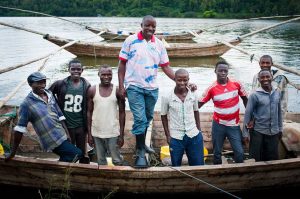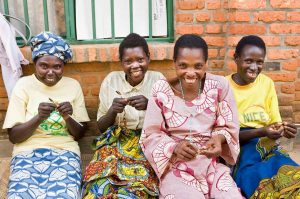The Mentor Capital Network interviewed Jason Seagle the CEO and Co-founder of Vayando on March 30, 2016.
Vayando was a participant of the MCN’s Sustainable Business Plan Collaboration in 2015.
Vayando connects curious travelers with micro-entrepreneurs in emerging economies around the world. The company works to put local entrepreneurs on the tourism map by developing a travel landscape where people from around the world connect directly with thousands of skilled entrepreneurs to learn about their livelihoods. Below, Jason Seagle speaks about how his experience as a Peace Corps volunteer motivated him to start Vayando and shares his hopes for the future of his company.
Tell me about more about Vayando and what makes it unique.
We are a for profit social enterprise based in Atlanta, Georgia. We serve as a booking platform that markets local entrepreneurs in developing countries as a way for travelers to connect with locals and learn about their livelihood. For example, a traveler can connect with innovative farmers, fishermen artisans, street photographers, and many more. We have been live in Rwanda and Costa Rica for over a year and have a one hundred country goal for the company. We connect with different organizations to diversify our platform of entrepreneurs; one successful partnership has been with Peace Corps. They have over 7,000 volunteers who have access to the backend of our platform and can upload profiles for entrepreneurs from the field and submit it for us for approval.
I believe what makes our company unique is the accessibility for entrepreneurs. For example, when someone makes a booking it is converted to SMS and sent to the entrepreneur making it so he or she does not need to have to have access to internet. We are a brand for independent travel and we want Vayando to eventually be a tool so that when someone steps off the bus or a train in new country they come to us to find these hyper local experiences and connections. We are currently working on partnerships with several hotels and setting up referral programs for those who want to integrate more local experiences into their travel.

How did you and your co-founder become interested in this problem?
My background is in international development, focused on livelihood development, and that’s part of the reason behind my motivation for Vayando. Scott and I have known each other for 12 years now and we were Peace Corps volunteers in El Salvador together. I was based in a farming village on the border of Honduras and whenever a new group of trainees would come to village I would organize trainings on agro forestry. I organized the training sessions but the facilitation was done by locals from my community. I was always so impressed with the local knowledge base and the pride they had in sharing this information. These were local farmers who oftentimes had minimum formal education but were confident standing in front of group of college educated Americans. It was good to see the quality of information they shared and that their children were often present watching their parents in this role.
Moreover we used to meet travelers on the bus, and people would always say how the local experience was amazing and how it was so hard to find that in a traditional travel guide service. We just started to think about how we could tap into that in a way that is beneficial the local communities and that is also a business opportunity.
How does your pricing work?
We charge a 25% margin on top of whatever the entrepreneur is charging. That is determined when we onboard a new entrepreneur, as part of the process is to discuss with them what they think is a fair price for them, we found that nine times out of ten they undercharge. Me and Scott feel strongly about making sure that entrepreneurs see their value.
How many customers have you been able to serve so far?
I would estimate 400 customers at this point. We have been seeing steady growth in the last couple of months since my partner moved to Rwanda to take care of field operations. This has been really helpful mainly since 70% of our current customer base is in Rwanda.

Have you noticed any patterns with your customers when it comes to age or gender?
More of our customers are women and that I would say is because our program has been vetted by lots of reputable third party field partners and development organizations. We want to strengthen that and are working to integrate a review system into our platform. Our service really is a way for anyone to walk confidently into a rural community and have that connection and feel safe about it. We had a female customer who worked and lived in Rwanda book a fishing trip with 7 fishermen on lake Kivu, be very comfortable and feel completely safe about it.
We are focused on designing our platform in a way that attracts a wide demographic of travelers, e.g. younger backpackers, families and retirees. Our commitment to support poverty alleviation in developing countries is a priority. However, we also don’t want that to be what we are all about; we want that to be naturally integrated into our model. This also applies to our entrepreneurs. They also fall across the board, so we have the local pottery makers who earn two dollars a day and a woman who has a degree in international economics and quit her banking job to open a boutique fashion shop. One of our most famous entrepreneurs is the five-time national boxing champion of Rwanda who gets booked to teach boxing.
One of the things we like our companies to think about is the differentiation between customers and beneficiaries. Customers are those who pay and beneficiaries are those whose lives are made better because Vayando exists. Who would identify as your customers and beneficiaries?
We have a double-sided market in that regard. We have our customers, the travelers, and we have prioritized them as part of the company culture. We provide lots of support, talking to our customers to get their feedback and integrating that into the next iteration of our platform. On the flip side there are the entrepreneurs. I have worked in the field a number of years and I know from having to pitch community projects to different groups that the rural farmer in east Africa can tell pretty quickly if the project will have value to him. This is one of the reasons I feel very good about Vayando, because people see that value in a minute, and as much as we want to benefit the local communities we have to be careful because we don’t want to distort the local economy or exploit poverty. Our goal is not to make tour guides but help the entrepreneurs supplement income, build their business and create market connections. The question becomes how we can bump up our price point but not over step on any of our fronts.
How many entrepreneurs in your platform so far?
There are 80 up on the website and there is a back log of profiles we want to get up on our website. Our website is good and functional but it is a bottleneck so now we are working on a much more scalable platform right now that will open on more rapid growth in terms of putting more content and being able to market it efficiently.
What is the gender ratio and age rage amongst entrepreneurs?
We have a goal to reach 50 % women entrepreneurs. In terms of age range we have people who are young as 19 and in eastern Rwanda we have people who are 75.
Is the relationship sustained between the entrepreneur and the traveler sustained?
On a case by case basis and that’s because of some feedback we have gotten is some travelers want to continue supporting the entrepreneur and their business and we want to make it clear that we aren’t a charity. However phase two for us is to be a marketplace for artisans or producer cooperatives amongst our entrepreneur pool.
What were the hardest parts of launching Vayando?
To coordinate between Atlanta and Rwanda, but now Scott moving here has helped a lot as he is now on the ground. Also we were constantly asking ourselves how do you take a basic idea and create a business model around it that is potentially very scalable to a global level.
Finally, my own personal insecurity stepping away from a career position to focus on this when there was a lot of unknown. I mean just waking up and not having a set schedule or someone looking over your shoulder for a deadline took time to get used to, its 100 percent self-motivation.
Do you think Vayando has passed through a make or break moment?
It’s definitely an ongoing learning experience. I was told pretty early by a friend here in an Atlanta that it would be hard and that making mistakes is to be expected, but I should make sure that we don’t make a mistake that is irreparable. That has made us very deliberate and cautious about our decision making process. I believe there was a tipping point when it was first me and Scott doing all the calls to when we got media coverage and literally it all changed, and suddenly we were receiving emails from organizations that were interested in seeing when we will be in their country. That for me really validated what we are doing.

What challenges are you currently facing?
Financing is an issue. We are operating on a tight budget by and large, and we have been supported by some smaller grants here and there. The upside of this challenge is we have been forced to be really creative with how we fund this business and grow it.
Another challenge is investor groups in Atlanta. As much as the startup community is very supportive and thriving, the investors are still conservative in terms of impact investing. They are doubtful about the fact that we are focusing on social impact.
How many people employed with Vayando?
Aside from the co-founders there are three staff members in Rwanda one country coordinator in Costa Rica and a few interns.
How has MCN helped your company?
MCN is probably the most beneficial program we went through mostly because of the level and quality of feedback that we received was high. I remember I spent a lot of time going through the pages of feedback taking notes and looking at similar themes.
I reached out to everyone and had conversation with over 90 percent of the mentors and it really honed in our model and a lot of different strategies came to my attention because of the feedback especially in terms of branding.
Learn more about Vayando on their website.